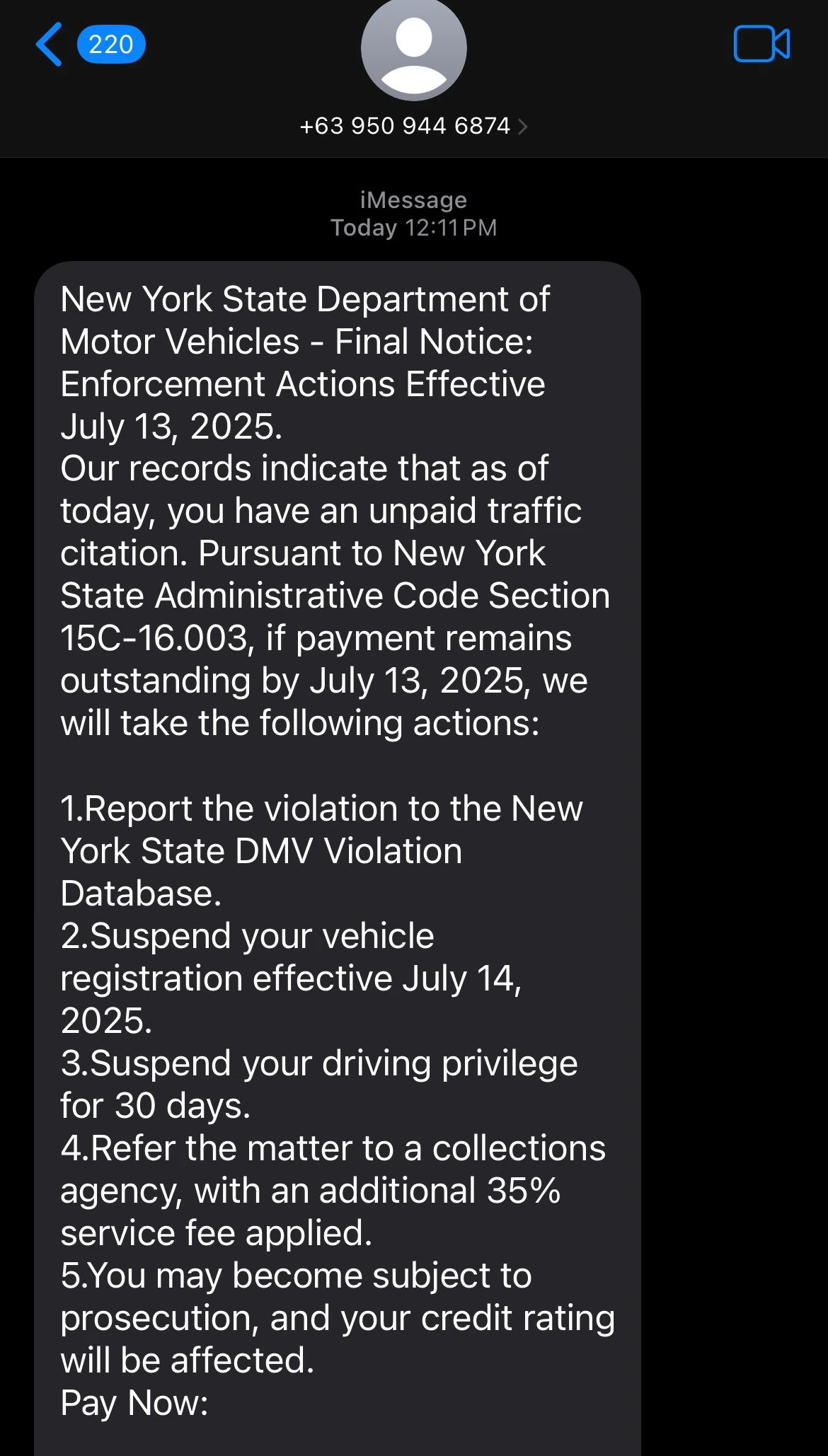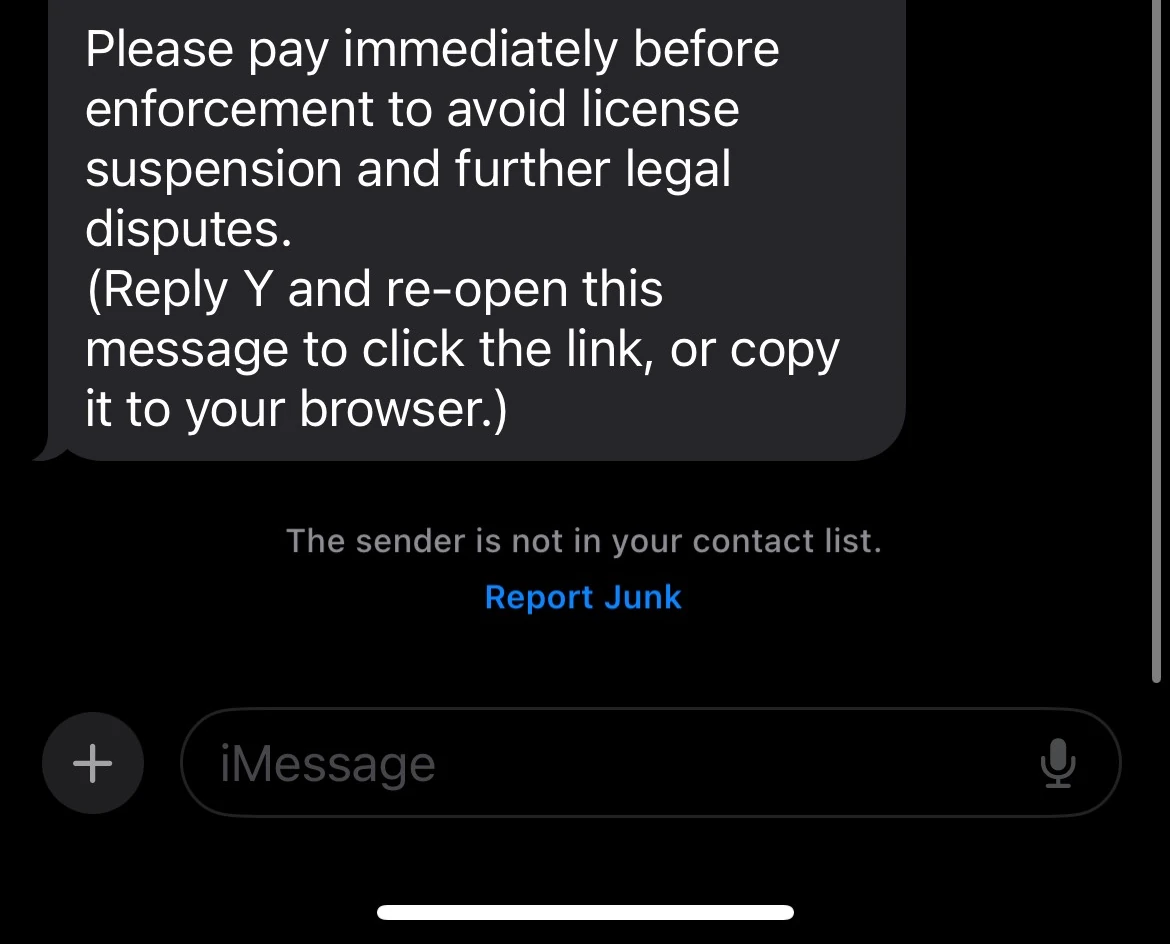
DMV Text Scam: How to Spot and Avoid Fake “DMV” Text Messages
Published on 7/15/2025
Starting in late May of 2025, many people have received the following text message on their phones:
Department of Motor Vehicles (DMV) Final Notice: Enforcement Penalties Begin on [date]. Our records show that as of today, you still have an outstanding traffic ticket. In accordance with Administrative Code 15C-16.003, if you do not complete payment by June 24, 2025, we will take the following actions:
1. Report to the DMV violation database
2. Suspend your vehicle registration starting [date]
3. Suspend driving privileges for 30 days
4. Transfer to a toll booth and charge a 35% service fee
5. You may be prosecuted and your credit score will be affected Pay Now:
Please pay immediately before enforcement to avoid license suspension and further legal disputes. (Reply Y and re-open this message to click the link, or copy it to your browser.)
Please note that this is a scam. It was not sent to you in connection with any ticket that you received. If you clicked on the link, you may want to contact an IT professional.
What is the DMV Text Scam?
The DMV text scam is a phishing scheme where criminals send fake text messages pretending to be from your state's Department of Motor Vehicles. These messages typically claim there's an urgent problem with your vehicle registration, driver's license, or that you owe outstanding fees that must be paid immediately. The scammers create a false sense of urgency by threatening consequences like license suspension, vehicle impoundment, or hefty fines if you don't act within a specific timeframe.
The ultimate goal is to trick you into clicking malicious links that lead to fake websites designed to steal your personal information, including your Social Security number, credit card details, and banking information. In some variations, scammers may ask you to call a phone number where they'll request sensitive information directly over the phone. Once they have your data, criminals can commit identity theft, make unauthorized purchases, or access your financial accounts.
These scams have become increasingly sophisticated, often including your name, partial license plate numbers, or other details to make the messages appear legitimate. However, no matter how official they look, unsolicited DMV text messages requesting immediate action or personal information are always fraudulent.
How to Spot DMV Text Scam Messages
Recognizing a fake DMV text is easier once you know the telltale signs that scammers consistently use. The most obvious red flag is receiving any unsolicited text message claiming to be from the DMV, as legitimate DMV offices rarely communicate through text messages and never send urgent demands for immediate action via SMS.

Look for urgent language designed to create panic, such as "expires today," "immediate action required," "avoid arrest," or "within 24 hours." Scammers use these high-pressure tactics to prevent you from thinking clearly or verifying the information through official channels. Legitimate government communications typically provide reasonable timeframes and don't threaten immediate consequences.
More Reading
Disclaimer: All the content of this website has been prepared by Benjamin Goldman Law Office PC for informational purposes only and does not constitute legal advice. The information on this website shall not be construed as an offer to represent you, nor is it intended to create, nor shall the receipt of such information constitute, an attorney-client relationship. Our hope is that you will find the information useful and informative, and we would be happy to communicate with you and answer any questions you may have about our legal services. Readers should not act upon the information on this website, or decide not to act based upon the information on this website, without first seeking appropriate professional counsel from an attorney licensed in the home state of the drivers license of the person who received the relevant traffic citation.